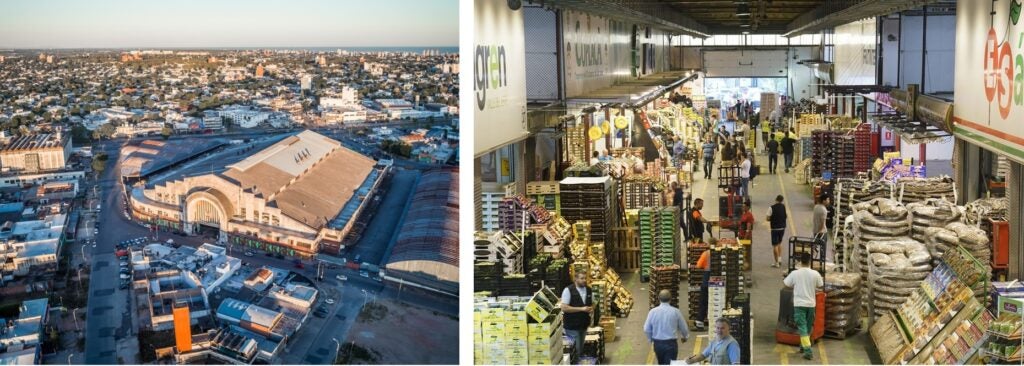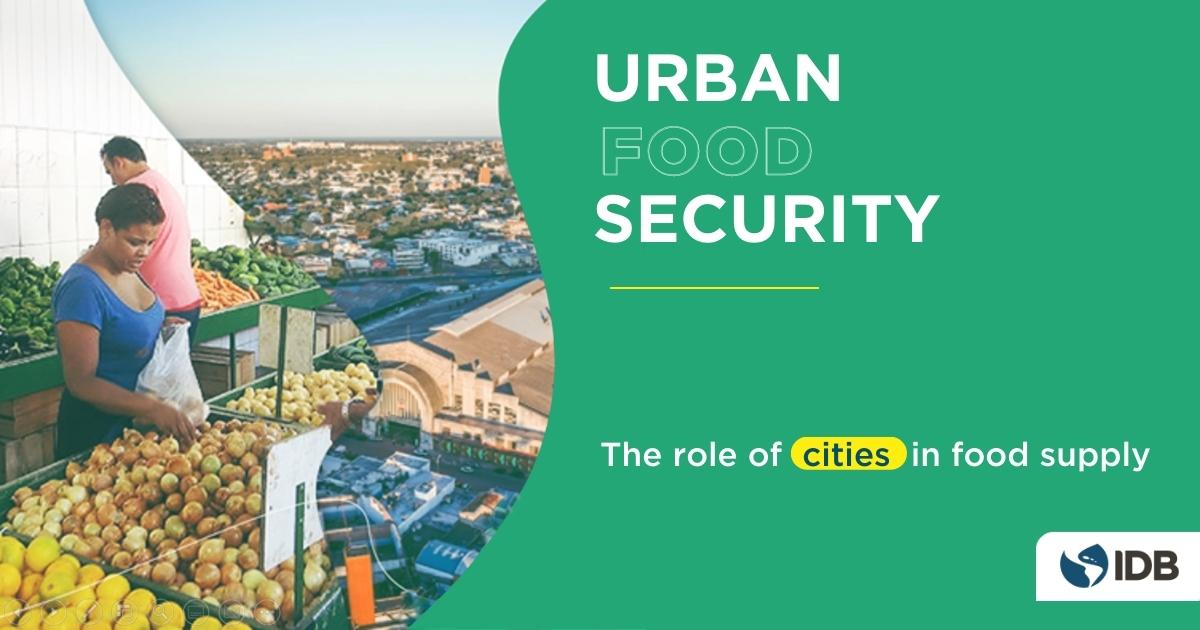Este artículo está también disponible en / This post is also available in: Spanish
Have you ever wondered what cities can do to facilitate food security for their inhabitants? Cities are susceptible to disruptions in transportation, distribution and supply chains, which can quickly lead to food shortages. By proactively addressing food security, from planning to investments to health policies, cities can anticipate distribution flows, develop contingency plans, strengthen local supply chains and promote diversified food sources, supporting reliable food supply. Considering that 80% of the population of Latin America and the Caribbean (LAC) lives in cities and depends on the availability and accessibility of food, ensuring food security in urban areas is essential for the well-being and resilience of metropolitan areas.
To analyze the important role that cities play in managing the food security of their inhabitants, today we begin a series of blogs that will be especially useful for those cities in the region interested in learning how to take a holistic view of the food chain. Our readers will learn how to establish sustainable sourcing, promote food diversity, boost economic development, reduce food waste and foster innovation.

The role of cities in the food chain
Rapid urbanization, changing food consumption patterns, increasing malnutrition, climate change and the COVID-19 crisis have highlighted the increasingly important role of cities and their metropolitan areas in food systems. Although urban areas are part of the challenges of food insecurity, malnutrition and poverty, they are also the places from which innovative solutions can be provided by taking advantage of the characteristics of their territories and their networks of interdependencies.
Ensuring food security requires a value chain that connects rural and urban areas. By 2050, more than 80% of food is expected to be consumed in cities. Therefore, a comprehensive vision of the food chain is needed to establish a sustainable supply, promote food diversity, boost economic development, reduce food waste and foster innovation.
The leading role played by LAC cities in food security makes it necessary to integrate food policies into urban planning and make them an integral part of city development. For this reason, during 2023, the Housing and Urban Development Division of the IDB, together with its Cities Network, as part of its agenda on urban strategies for food security in cities, will present three webinars where the main challenges of cities in food security in our region will be analyzed. Below, we share a summary of these webinars:
1. Can we move wholesale markets out of city centers?
Wholesale markets play a fundamental role in the organization, collection and distribution of local agricultural production. Most wholesale markets are located in urban centers and are part of urban rehabilitation processes, integration of urban centers, and a key part of the economic development of cities. However, markets have not been considered as part of city planning and their location could be more strategic to meet the needs of a greater number of people and facilitate more efficient and less polluted mobility in cities. An important fact is that a significant part of the population lives in informal settlements poorly connected to the city centers, which prevents easy and quick access to logistics centers.
Should wholesale markets then be located outside the cities? Watch this webinar, and do not miss any details:
2. How to connect food systems and city systems: the role of metropolitan scale
More and more often we expect cities to find solutions to food problems that arise within their borders. However, many of these problems transcend borders and require cross-jurisdictional governance mechanisms. Some of these problems include:
- Land use zoning and planning.
- Regulations governing urban and peri-urban agriculture.
- Investments in green infrastructure for flood risk reduction and biodiversity
- Large-scale projects involving modern wholesale food markets or agri-food parks.
As food systems evolve, the term “city-region” is increasingly recurrent given the need for food issues to be addressed from a regional perspective that encompasses urban, peri-urban and rural space. It is evident how a metropolitan government can have greater access to human and financial resources, and more responsibility and authority to govern service delivery in a geographic zone and economic area. Through the cases of Quito, Medellin and Belo Horizonte we analyzed how food systems and city systems are connected at the metropolitan level. In addition, we learned how this cooperation has led to ensuring effective governance around food security. Find all the details of the webinar in the following recording:
3. Urban strategies for food security: what can cities do in the face of the reality of migration?
Finally, another crucial factor that will be discussed in the webinar series has to do with the dynamics of national and transnational migration that are generating an accelerated population increase in cities.
Migrant communities are increasing the demand for priority services, exceeding the coverage of policies, strategies and social investment programs in urban areas, surpassing the response capacity of subnational governments, which often barely meet the needs of regular residents. Access to good food is one of the most critical services. For this reason, we will refer to programs aimed at overcoming the food insecurity of this vulnerable population group.
There is a close relationship between the increase in the urban population and the reduction of the labor force in the rural agricultural sector due to migration. This fact could be contributing to the increase in costs and food shortages, with the consequent increase in food insecurity indexes. Faced with this situation, how are cities preparing to meet the food needs of all their residents? Given that urban environments will continue to grow, it is important to implement strategies to provide food security for new residents. In this way, we will ensure the proper integration of migrants into the city through permanent institutional programs that connect international support, food systems and urban policies.
Don’t miss this series of articles!
Estamos convencidos de que estos artículos serán muy relevantes para apoyar a las ciudades que deseen mejorar y adaptar la seguridad alimentaria en sus ciudades. Si este contenido te ha resultado de interés, te invitamos a que te registres a nuestra newsletter, y a que nos sigas en nuestras redes sociales, en LinkedIn, Facebook y Twitter.
*This article was coordinated by Ophélie Chevalier.


Leave a Reply